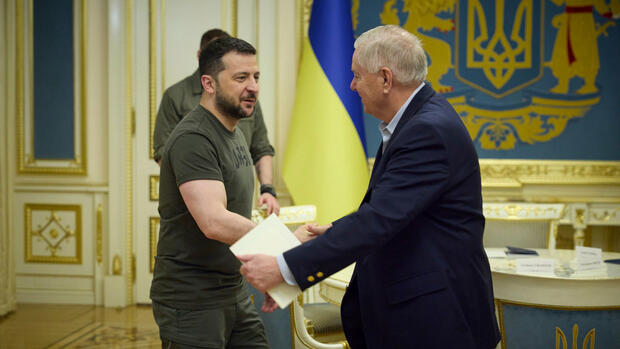Graham is one of the top advocates for Ukraine aid in the US Congress.
(Photo: dpa)
Washington The Republican Lindsey Graham, leading foreign policy officer in the US Senate, likes to use sentences that stick in the memory. “Anyone who jumps on the Putin bandwagon is dumber than dirt,” he once said of China. The reason for this was allegations by the Americans that China could supply weapons to Russia for the Ukraine war.
The 67-year-old politician from the US state of South Carolina is controversial, also because of his loyalty to Donald Trump. But Graham is an important ally for Europe: he is one of the biggest advocates of aid to Ukraine.
A few days ago, the Russian Interior Ministry even issued an arrest warrant for Graham after he visited Ukrainian President Volodymyr Zelensky in Kiev. The senator had declared during the meeting that “the Russians are dying”. US military aid is “the best money we’ve ever spent,” Graham said.
The Republican is likely to play a central role in aid to Ukraine in the coming months. Because it is possible that the US Congress will have to approve a new billion-euro tranche in the summer, before the end of the budget year. The US is the mainstay of Ukraine’s defence, with US President Joe Biden’s administration approving around US$113 billion in military, economic and humanitarian funds.
The issue of aid to Ukraine is currently being discussed more intensively again – in connection with the debt ceiling. Congress plans to temporarily suspend the debt limit by the weekend to prevent the United States from defaulting.
The flow of money from Washington could falter as early as July
In the course of the debt talks, it was agreed that defense spending should only increase moderately. Graham criticized that the targeted military budget was too low. “The biggest winners are China and Putin,” he said.
>> Read here: Debt deal passes the US House of Representatives – and has to clear another hurdle
The US Congress will negotiate exactly how the defense budget should be structured in the fall. However, according to Politico magazine, the flow of money from Washington to Ukraine could be in danger as early as July. Of the $48 billion that Congress approved for Ukraine in December, there are still a good $6 billion left.
There is already a discussion in Washington as to whether the White House will therefore promptly apply for a special package and how high it could be. But every new aid package has to go through the US Congress, which has been divided between Democrats and Republicans since the November midterm elections. A small but powerful isolationist far-right, particularly in the House of Representatives, is demanding concessions for its support for Ukraine.
Resistance could increase in the US election campaign, because presidential candidates like Trump want to abolish aid to Ukraine and are thus also met with approval in the Senate. “I really don’t care what happens to Ukraine,” said Republican JD Vance, who became known in Germany for his memoirs “Hillbilly Elegy”.
If Putin succeeds in conquering Ukraine, it will encourage Chinese aggression against Taiwan. Mark Warner, head of the US Senate Intelligence Committee
Voices like these are in the minority. Most of the 434 MPs and 100 Senators on Capitol Hill support aid to Ukraine. After all, the US wants to prevent a Russian victory at all costs – also for reasons of geopolitical deterrence.
“If Putin succeeds in conquering Ukraine, it will encourage Chinese aggression against Taiwan,” warned Mark Warner, head of the US Senate Intelligence Committee. “It is critical that we supply Ukraine in a timely manner and without disruption,” said Republican Senator Susan Collins.
US public opinion on the Ukraine war is changing
The White House on Thursday stressed that the debt limit agreement does not threaten aid to Ukraine. There are also ways to circumvent the official military budget through “supplemental spending bills”. Such special editions were regularly decided during the wars in Iraq and Afghanistan.
>> Read here: “Ukraine war is a warning that nothing is certain” – Western financiers are facing a financial hole
But the longer the Ukraine war lasts, the more Ukraine aid could be up for debate. “We cannot assume that Western support will continue at current levels,” said Charles Kupchan, former Europe director in Barack Obama’s National Security Council.
“Public opinion in the US is gradually changing. And when it comes to providing ammunition, air defense or tanks, we come up against limits, although we produce at the highest level,” explained Kupchan, who is now a security expert at the Council on Foreign Relations think tank.
More: “We don’t want to end up like Germany” – DeSantis’ bumpy start to the campaign
